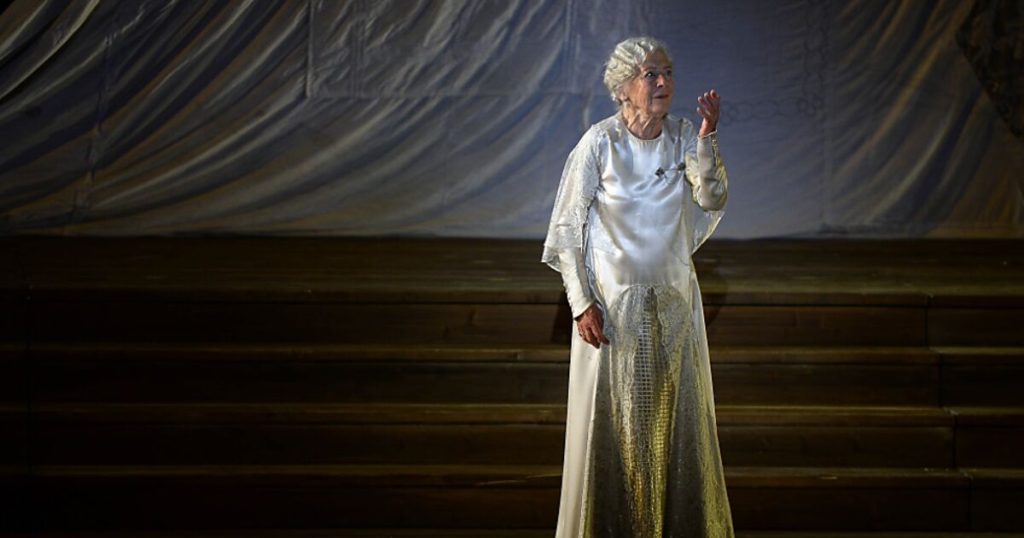Acting was her life. For more than six decades, I’ve stood on the boards that mean the world – from which I largely withdrew a few years ago. As “Frau Vejvoda” in the cult series “A Real Viennese Doesn’t Go Under” she wrote an unforgettable piece of television history. Today, Julia Gschnitzer, Tyrolean and Grande Dame for life, is 90 years old.
The role of Mother of All at the Salzburg Festival, which she has played since 2013, was the primary end to a career like no other. “I don’t want to do big things anymore. Now I’m already retired,” the Innsbruck native laughed in an interview with the APA on her 85th birthday. Learning the text is now very difficult. She admitted frankly at the time: “And joy is smaller than fear.”
“I want to enjoy my own life. Reading, walking, traveling,” explained Gschnitzer, who lives in Elsbethen near Salzburg. There she received honorary citizenship in the run-up to her 90th birthday. Celebrating a birthday isn’t exactly her passion. “She tried to hide me,” she said five years ago, on such an anniversary. Trying to suppress the “disturbing age”. Otherwise it would be “unbearable”. Also in the ’90s, she announced that she wanted to “hide” because of all the attention.
In her job, which has always been her goal, Julia Gschnitzer cannot be overlooked during her lifetime. When asked about some of the highlights of her acting career, she once said there were so many that it was impossible to list them all. Although she always saw theater as the center of her creative power – she “became a theater actress” – there are unforgettable moments in film and television. The role of “Frau Vejvoda”, mother of “Nudlaug” Franzi Tyrolean, in “Mundl” naturally included: “It was a wonderful time. Relaxing and beautiful, with wonderful fellows.”
As it was announced, he eventually stayed at least a little bit for film and television. Gschnitzer is seen in Altaussee’s crime novels “Last Kirtag” and “Last Summit”. A few years ago, the APA awarded a theater (directing) certification that was in need of improvement. The type of staging and presentations are completely different, “No longer universal”. Your “fantasies and ideas” are more important than command. Gschnitzer in particular criticized the directors: “The piece at stake takes a back seat.” One no longer puts oneself at the service of the cause. But at the same time, the actress drew on the inevitable end of this theatrical development, more like a downward spiral: “You can do nothing more than jump naked. Then we hope to be human again.” Back to the human,” that’s what it’s all about, according to Gschnitzer.
Julia Gschnitzer was born on December 21, 1931 in Innsbruck. She made her debut at the Tyrolean Theater in 1951, where she was engaged until 1954. Guest performances took her to the theater “Vorarlberg” in Bregenz. Gschnitzer then moved to Switzerland, where she could be seen at the Städtebundtheater in Biel-Solothurn until 1956 and then for three years at the Stadttheater in Bern. Since 1959 she has been at home mainly on stage in Vienna and Salzburg, but also at the New Town Theater in Posen.
From 1959 Gschnitzer worked in various theaters in Vienna. At the Folkstra Theater, she portrayed Mrs. Flamm in Gerhard Hauptmann’s “Rose Bernd” (1979/80), Marth Rolle in Kleist’s “Zerprissim Krog” (1980/81), and Kate Keeler in Arthur Miller’s “Alle Meine Söhne” (1981/82) , Trine in “Erde” by Karl Schoenhair (1981/82) or Regina Grothum in “Der Aufstieg der Regina G.” (1996/1997 In The Suburbs) by Friedrich C. Zoner. At the Tyrolean Theater, she excelled in 2000 in the infernal trio “Wetteruchten” by Daniel Cole.
Gschnitzer has played repeatedly in Salzburg, mainly as a regular guest at the State Theatre. Big roles included Mrs. Peachum in “Threepenny Opera” (1987/88), Maria in “Josef und Maria” Turini (1991/92), mother in Georges Tabori’s “Mutters Courage” (1995/96), Frau Worm in Werner Schwab “Destruction of people or my liver is meaningless”, the grandmother in Horvath’s “Tales from the Vienna Forest” (2000) and the mother in Thomas Bernard’s “Am Ziel” (2002).
Awards and honors have not been missing in her long career. In addition to the Vienna Silver Medal of Honor, she was also awarded the Karl Schrab Prize and the Tyrol State Grand Medal of Honor. In 1989 Gschnitzer was appointed Chamber Representative in Vienna. In addition to Mundl, important television works by Axel Cortis included “Fall Jägerstätter” (1971), “Lemminge” by Michael Haneke (1979) and “Die Siebtelbauern” (1998). The Busy Woman was also in front of the camera in Xaver Schwarzenberger’s Andreas Hofer. In 2001 she got the role of “Seffin” in Anzengruber’s adaptation of “Der Schandfleck”, which she played in Julian Pölsler’s “Flowers for Polt” and in both parts of Peter Säman’s modern hometown film “Im Tal des Schweigens” (2004/2005) , as well as in the movie “Raunacht” by Stefanos Domanij (2005). She appeared in “The Breath of Heaven” by Reinhold Bilgerie in 2010 as well as in “Luis Trenker – The Thin Line of Truth” (2015).

“Travel aficionado. Certified problem solver. Pop culture guru. Typical writer. Entrepreneur. Coffee trailblazer.”








More Stories
Magic Abba – Europe's #1 Music Show Live with the Band
Joseph Hader faces 'turbulence surrounding a peaceful person'
Live streaming platform Kino VOD Club brings focus to Graz